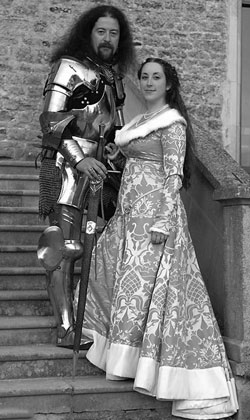Stop a handful of women walking down the street and ask them if chivalry is dead. More often than not their response would fall along the line of a laugh accompanied by a snort, a shake of the head indicating a “yes,” or a feeble attempt at defending males with a weak statement about that guy who one time held the door open for them.
Now, some would say that this loss in gentleman-like behavior is a result of the modern-day man simply being lazy and not putting forth the effort to court a lady. However, this very well might not be the case ladies.
Before looking into the meat of the matter, perhaps people should take a look into the meaning of chivalry itself.
As defined by Dr. Nancy Mezey, Associate Professor of Sociology, chivalry is the idea that a man should go out of his way to treat a woman with protective respect.
Mezey further points out that because knights were the ones who used to be acting in this manner, chivalry is a gendered term. Therefore in today’s society when chivalry is discussed, it is most commonly used when referencing a man.
More recently, it would appear that men are acting with an absence of their chivalric duties, or so some women say. Freshman Daniella Fulton said that nowadays, the norm has become that women almost expect men to not act in a gentlemanly fashion.
“You hear a lot of jokes about guys just being jerks from your friends, the older women in your family, and especially in the media and on T.V. At first it might just seem like joking, but because it happens almost everywhere and all the time, you just start to believe it, especially once you see a guy do something rude. It kind of solidifies the idea,” said Fulton.
While Fulton brings up the point that media is often the blame for certain social influences, Mezey also believes that there could be another social cause behind the proposed lack of chivalry displayed by men today.
Mezey said that the recent rises in power of the modern-day women, as well as the whole feminist ideology, could very well be a driving force in the absence of chivalry. “Because gender relations are changing, the rules of dating and gendered interactions are changing as well. So young women and men do not always know what actions will insult or please someone else,” said Mezey.
This uncertainty explained by Mezey in male-to-female social interaction is a cause that several can see, whether it be on the political scene or the interpersonal scene.
As junior Kyle Catialli said, it serves as an “invisible social line” a man has to be wary of. “Usually when I am out with a girl I try to be a gentleman, that’s just how I was raised, but sometimes you feel like you have to hold yourself back from doing or saying something so not to offend her. It’s honestly difficult because you never know if a good intention could turn into an insult in her eyes,” said Catialli.
Men are trying to be chivalrous, even holding themselves back from saying and doing things they believe to be offensive in order to not insult anyone, but does this mean that chivalry should still return even though some might see it as demeaning to women?
“If you are asking if I think returning to a time of chivalry would be better because fewer people would be insulted, my answer is no,” said Mezey. “I can say without question that I would rather live in the current times than return to medieval times. Although gender inequality most certainly exists in 2013, we have come a long way toward equality since the Middle Ages.”
Because of the strides in society since the first development of the term chivalry, Mezey instead suggests that respect should be the general rule for everyone, regardless of their gender. “Taking care of or protecting someone should not be the job of men over women. Instead, if someone needs help, regardless of their gender or age, we should help them, not to be chivalrous, but to be helpful and respectful, and to be good citizens, neighbors, and friends,” said Mezey.
So while the chivalry debate might still be up in the air for a while now, as shown by Catialli, the wish to still do good and act as a gentleman is not absent in men, just repressed out of the caution of insulting another. Yet as Mezey points out, this act of respect is not something that should be seen as insulting, but it also should not be gender specific, but gender universal.
While the code of chivalry might be outdated in serving as a code of honor amongst men, respect is a trait that can be seen as admirable amongst modern men and women alike.
PHOTO TAKEN from cmex.uz




